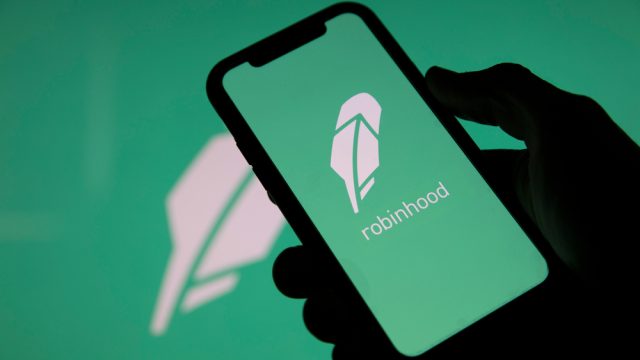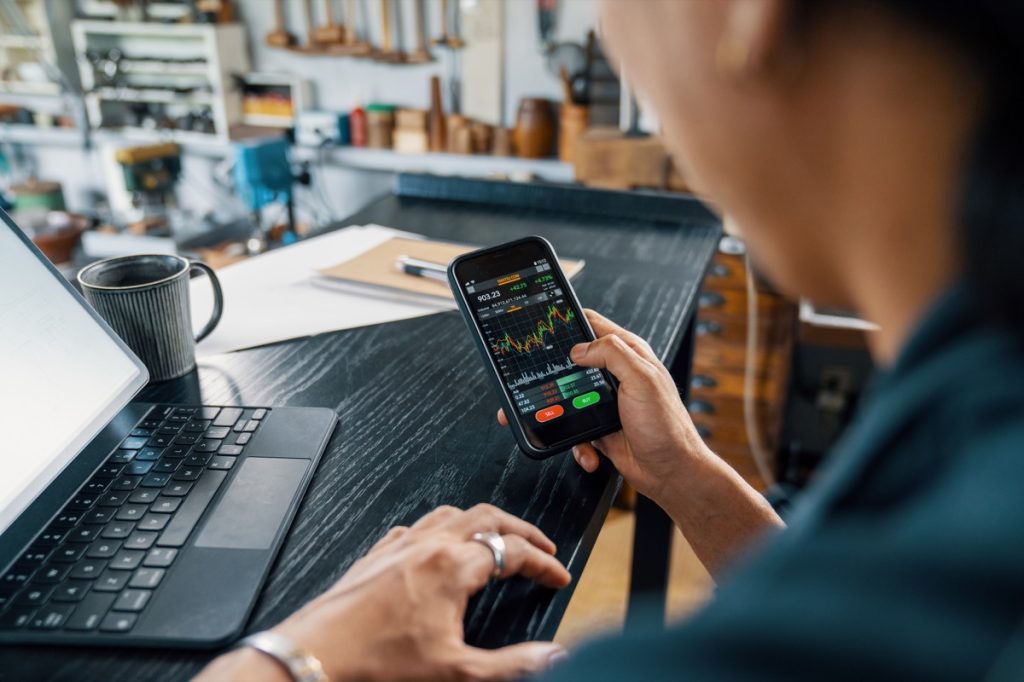5 Red Flags About Using Robinhood for Stock Trading, According to Experts

Depending on how you manage your finances and investments, there’s a good chance you’ve heard something about Robinhood. The app has skyrocketed in popularity as an easy way to buy and sell stocks right from your phone without paying a commission. But while fans of the service say it has democratized these types of transactions for the public, there are still a few parts of the service that might give some people pause. Read on to discover the red flags about using Robinhood for stock trading, according to experts.
READ THIS NEXT: 4 Warnings About Using TurboTax, According to Experts.
1
It can be unreliable.

Part of the appeal of Robinhood is how quickly it allows users to place stock purchase orders. Unfortunately, it might not always work as advertised.
“Robinhood has faced several outages and technical issues in the past, leaving users unable to access their accounts or execute trades during critical market moments,” says Ryan Lei, a former day trader and founder of PadPCB. “This can result in significant financial losses for traders who rely on the platform.”
2
It can lead to more significant losses than traditional accounts.

Most people are drawn to Robinhood by how easy it can make it to begin buying and selling stocks while hopefully turning a profit. But experts caution that one element of the app might end up hurting your bottom line more than you anticipate.
“One of the biggest risks with using Robinhood is so-called margin trading, which allows users to borrow money from their brokerage account and engage in leveraged trading,” Harry Turner, financial expert and founder of The Sovereign Investor, tells Best Life. “Leverage amplifies both gains and losses, meaning that even small market fluctuations can have a drastic impact on your account balance. As such, margin trading can cause you to lose more money than you initially invested.”
“Other risks associated with margin trading include higher costs from interest payments as well as any fees for missing loan repayments,” he adds.
In an email to Best Life, a company representative contested this and said these concerns are not unique to Robinhood. “Robinhood strongly suggests people be thoughtful about margin trading.” They also pointed out a statement on the company’s website which reads: “You have to determine whether margin investing is consistent with your investment strategy. You should consider your own investment experience, goals, and sensitivity to risk. By enabling margin investing for your brokerage account, Robinhood is not recommending the use of margin investing.”
READ THIS NEXT: Always Use Cash for These 5 Purchases, Financial Experts Say.
3
It might not be the best long-term trading platform.

Thanks to its relatively easy-to-use functionality, Robinhood is popular among many first-time traders who are just beginning to grow their portfolios. However, it might not be best suited for anyone looking to take their investment strategy to the next level.
“I would say that many people typically ‘outgrow’ Robinhood as a platform,” says Robert Farrington, founder and CEO of The College Investor. “Since it’s mobile-first, it doesn’t offer all account types, and investments are limited. So if you build up an account there, you might find yourself outgrowing the options they offer.”
Others note its limited functionality for checking out new opportunities. “Robinhood’s user-friendly interface is designed for beginners, but it lacks the advanced research tools and charting capabilities found in other trading platforms. This can hinder users’ ability to make informed decisions and develop a robust trading strategy,” Lei says.
And unfortunately, while the platform operates on a famously commission-free platform, it will still cost you to take your funds elsewhere. “When you switch to a major full-service company, Robinhood will charge you $75 to leave,” Farrington says.
A representative for Robinhood pushed back against this in an email to Best Life. “Although it is true that Robinhood is popular among many first-time traders who are just beginning to grow their portfolios, most of the platform’s users are long-term, buy-and-hold investors. The company has many offerings that make it suitable for long-term investing, including the traditional long-term investment vehicles that other trading platforms also offer.” They added that the company has been deploying new features that will enable users to grow with their account over time, including a retirement product.
4
Its structure might create issues when you purchase stocks.

Besides its ease of use, customers are also drawn to Robinhood for its commission-free structure, which can maximize profits and incentivize more trades. But experts point out that this setup can also create larger potential issues for users in the end.
“Robinhood makes money through payment for order flow, a practice in which it receives payment from market makers for directing users’ trades to them,” says Lei. “This can create a conflict of interest and raise questions about whether users are getting the best possible execution prices for their trades.”
A Robinhood representative refuted the claims. “Similar to margin trading, we are not the only platform that uses PFOF, which has helped bring tens of millions of new investors into the stock market, many for the first time, driving the cost of investing and trading down to historically low levels. These concerns are not unique to Robinhood,” they wrote in an email.
The representative also pointed out that a study commissioned by Robinhood found “the price improvement for retail investors using Robinhood was better than the price improvement that institutional investors receive when they trade small lots on public exchanges.”
For more financial advice delivered straight to your inbox, sign up for our daily newsletter.
5
Help may not be readily available if you have any problems.

Traditional stock trading usually comes with an entire support network of a firm or at least the expertise of a broker who can look into any problems you encounter. But if you ever have an issue while using Robinhood, you might be left waiting a little longer than you’d like.
“Robinhood’s customer support is primarily conducted through email or in-app messaging, which can lead to slow response times and a lack of real-time assistance during critical trading situations,” says Lei.
Robinhood contests this, telling Best Life: “Robinhood has made enhancements to its customer support functionality and provides 24/7 chat and phone support to all of its users to provide efficient, real-time assistance to customers.”
Best Life offers the most up-to-date financial information from top experts and the latest news and research, but our content is not meant to be a substitute for professional guidance. When it comes to the money you’re spending, saving, or investing, always consult your financial advisor directly.